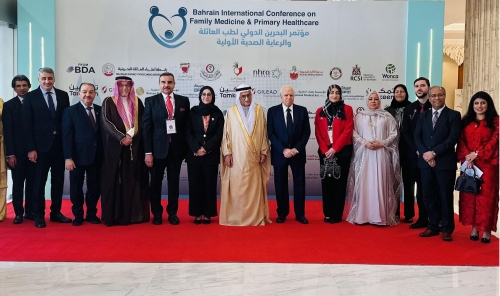Half of Elderly Patients Prescribed Risky Medications, Study Finds
TDT | Manama
Email : ashen@newsofbahrain.com
Professor Tom Fahey, a leading expert in general practice and epidemiology, presented critical findings on the safety and appropriateness of medication use in elderly populations during the Bahrain International Conference on Family Medicine and Primary Healthcare, held at the Gulf Hotel Bahrain.
Drawing from extensive Irish research, Prof. Fahey outlined trends in potentially inappropriate prescribing and adverse drug reactions, with a particular focus on patients aged 70 and above. His presentation was based on data from a large cohort study involving over 50,000 patients in the Dublin area, highlighting how hospital admission, both elective and emergency, were significantly associated with the likelihood of receiving high-risk medications.
Prof. Fahey emphasized the risks of polypharmacy, the simultaneous use of multiple medications—particularly among elderly patients, linking it to increased emergency visits, hospitalizations, and functional decline.
In a six-year observational study across 15 general practices in Dublin, a significant number of elderly patients experienced ADRs, with over 10% requiring emergency hospitalization. The most commonly implicated drugs were NSAIDs and certain psychoactive medications.
The research also investigated the rise in the use of strong opioids, such as morphine and fentanyl, which increased from 20% to 43% over a 15-year period. Prof. Fahey warned that these drugs carry well-documented risks, particularly in older populations, mirroring concerns across other European and American healthcare systems.
Another area of concern was the prescribing of medications affected by alcohol consumption. Interventions aimed at reducing alcohol-medication interactions showed modest success, though the impact on long-term health outcomes remained limited.
Prof. Fahey concluded by stressing the urgent need for policy interventions, better prescribing practices, and clinical guidelines to mitigate medication-related harm in aging populations. He called for family physicians and primary healthcare providers to play a leading role in addressing inappropriate medication use and improving patient safety.
- By 2015, nearly 50% of elderly patients were prescribed at least one potentially inappropriate medication.
- Drugs of concern included non-steroidal anti-inflammatory drugs (NSAIDs), long-acting opioids, and medications unsuitable for patients with severe hypertension or renal failure.
- Hospitalization was a major factor associated with increased exposure to risky medications, independent of other health conditions.
Related Posts

